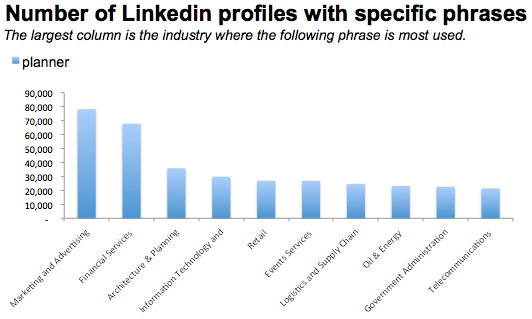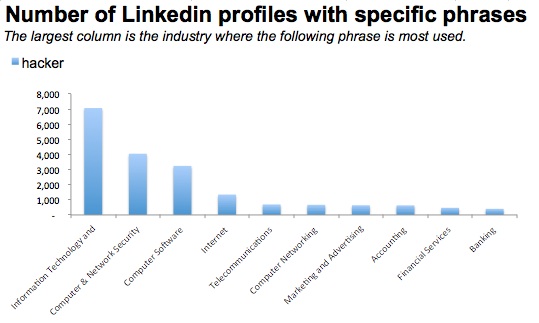So I turned to data to figure out the optimal term to feature in a headline.
My methodology was very simple, I used the Linkedin people search feature and each of the following terms one by one. This gave me numbers of profiles, that either matched to the headline, current job, or previous job titles. Based on how popular a term was, I could decide how to blend in or stand out.
So here is my starting point:
| manager | 9,591,802 |
| executive | 2,536,426 |
| consultant | 4,067,772 |
| associate | 2,337,363 |
| analyst | 2,272,782 |
| specialist | 2,272,776 |
| planner | 358,392 |
| expert | 678,437 |
| resident | 227,301 |
| hacker | 19,206 |
Why these ten terms? Because at this point in my career I'm still a generalist. I have an liberal arts background. Sure I've focused on online advertising for the past four years, but I need a broader term - a term that sounds cool but says absolutely nothing and everything at once.
So now that I had my 24 million profiles, I can jump to my first finding.
1. If you work in Marketing, your profile probably says "manager".
How blatant is this overuse? Almost half of the Marketing profiles come up for "manager."
2. The most "managers" work in Information Technology and Services.
Over 2 million profiles return for the phrase manager in Information Technology and Services (IT). Marketing and Advertising has been bumped to the third spot with only 1 million profiles. This leads me to my next finding.
3. Information Technology and Services profiles dominate Linkedin
Unfortunately Linkedin doesn't let you simply do an Advanced search by industry. But from only the 10 keyword phrases that I searched (this number is probably horribly wrong because it's counting many profiles several times but it's the best I can do without accessing the API) I was able to return 5 million profiles in IT.


The fact that IT has the most profiles is likely an indication of it's dominance of Linkedin and its wide array of roles.
5. Planners work in Marketing and Residents work in Healthcare.
The only two categories not dominated by IT were "planners" and "residents." This is likely because they are still very specific to their industry (Marketing and Healthcare, respectively) despite the occasional cropping up of "Resident Social Media Managers." I wonder how long it will be before these terms are generic enough to be adopted outside of their current industry.
Besides making a whole slew of charts, I was no closer to optimizing my Linkedin headline. Was my only finding that a lot of Linkedin users worked in Information Technology? Actually, not exactly. What I had found was that of the ten generic terms I started with, certain terms were industry independent (e.g. manager, executive, consultant) and certain terms still had industry connotations (e.g. planner and resident).
There had actually been one other term that had industry connotations - hacker.
You'll notice that hacker is popular only in IT, Computer & Network Security, Computer Software, etc, etc, until you get to Marketing and Advertising in the 7th slot. My read of this is that it's a term growing in popularity in the Marketing field, but with still strong technology ties.
Back to my Linkedin Headline. Since the goal is to improve the likelihood of appearing on relevant searches, and standing out from the crowd on first impression, I decided on:
Sam Feldman
Marketing, Data, and Technology Hacker
What are your takeaways for Linkedin SEO?
In my next blog post I'll take a look at whether various titles have an affinity for different cities, and then after that whether certain universities produce certain titles of jobs.
- Make sure you've got the most popular terms covered in your job titles. If your job titles aren't flexible, make sure you use the description or headline field to make your profile findable.
- Industry-specific terms should be predominant in your profile
- At the same time give yourself some edge with a new word or phrase that's slowly emerging into your industry.
In my next blog post I'll take a look at whether various titles have an affinity for different cities, and then after that whether certain universities produce certain titles of jobs.
As always I welcome your comments and feedback below.











No comments:
Post a Comment